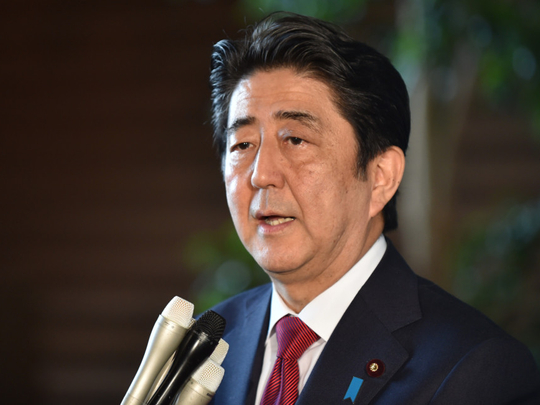
In 1960 Nobusuke Kishi, then prime minister, rammed through legislation to strengthen Japan’s military alliance with the US. He did so despite strong objection from many voters, hundreds of thousands of whom poured on to the streets in protest. More than half a century later Shinzo Abe, Kishi’s grandson, is at it again.
Last week, Abe secured lower house approval for 11 bills that would make it marginally easier for Japanese troops to fight alongside their US allies. As things stand Japan’s armed forces — officially still called the Self Defence Forces because of restrictions imposed by the pacifist constitution — can defend Japan only if it is directly under attack.
As in his grandfather’s day, there were noisy demonstrations outside parliament and commotion inside. The vote was passed after the opposition walked out of the chamber. Now the bills must be ratified by the upper house, a process likely to take two controversial months. Even if the upper house rejects them, the lower house — where Abe’s ruling coalition enjoys a hefty majority — is almost certain to drive them through.
Abe has neither the votes nor the public backing to amend the constitution outright. Adopted under the American occupation in 1947, it can be changed only after a referendum. So Abe has gone for second best by reinterpreting it instead. Under the new reading, disliked by constitutional experts, Japan will be allowed to engage in “collective self-defence”. That would enable it to come to the aid of allies — read the US — in the case of any conflict that could have an imminent impact on Japan’s security.
Abe has done a lousy job at convincing the public that such changes are necessary. Yoichi Funabashi, chairman of the Rebuild Japan Initiative Foundation, says the administration is bogged down in detail and has failed to make an emotional case. It has been deliberately vague — one might say dishonest — in spelling out the conditions under which troops could offer logistical support to allies, or even fight alongside them. The public fears that Japan will be dragged into reckless US adventures, such as the invasion of Iraq.
National interest
Though it is never set out explicitly, the main motive for the security changes is China (though an unstable nuclear-armed North Korea is also stiffening resolve). Washington, for decades frustrated at what it regards as Japan’s freeriding on American military spending, has long pressed Tokyo to take more responsibility for its own defence.
Like his grandfather, Abe is not giving Washington what it wants out of love for the US. He wants to strengthen the alliance for reasons of national interest. His grandfather, too, was determined to renew the US-Japan security treaty because he thought Japan would be safer as a result.
Conservatives such as Abe — and his grandfather before him — harbour resentment towards Washington for imposing what they see as victor’s justice. Kishi, who was in the wartime cabinet, was once arrested by US occupying forces as a suspected Class-A war criminal. Despite such reservations, conservatives still regard the alliance with Washington as the bedrock of Japan’s security and prosperity.
Abe, again in common with the grandfather he idolises, believes he is doing the right thing. Though his popularity has dropped sharply as a result of the national security bills, he will press ahead regardless. Kishi did so in the face of tremendous political adversity. Protests were so large that Tokyo was deemed unsafe for the planned visit of US president Dwight Eisenhower. A few months after the security treaty was acrimoniously ratified, Kishi resigned.
Events today are not quite so dramatic. Opponents of the bill, though many, are less vociferous. The media, shamefully, has mostly been cowed into silence by an administration that faces little serious parliamentary opposition. Abe has few challengers within his party and is likely to remain in office until 2017. That would make him one of the country’s longest-serving prime ministers in recent memory.
Like his grandfather, he is a conviction politician. He will ignore public opinion if he has to. As well as national security bills, he will restart nuclear power stations and sign the Trans-Pacific Partnership, policies that have lukewarm public support at best. Despite falling popularity, he looks more or less unassailable. Unlike his grandfather, Abe will get what he wants — and keep his job.
— Financial Times










